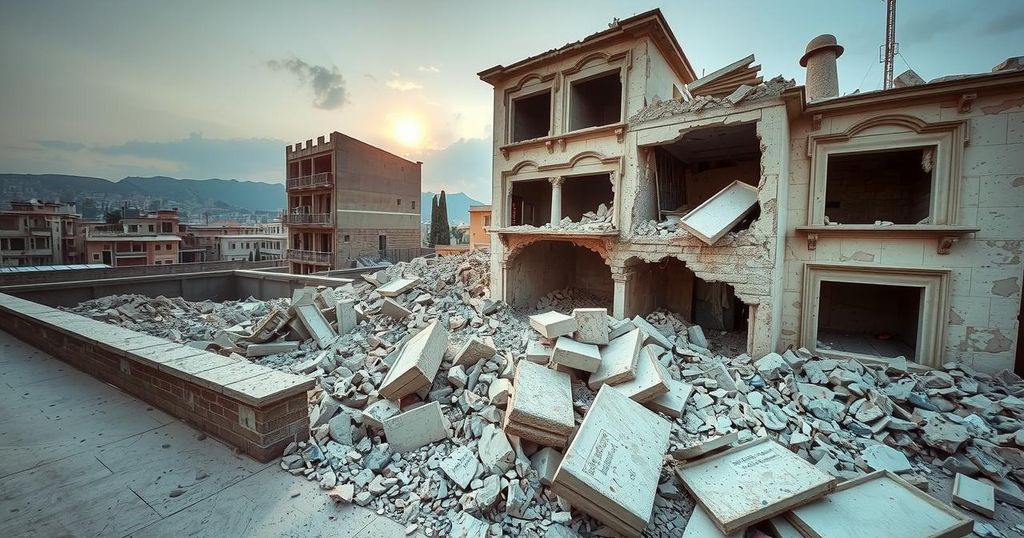The article discusses the evolving political dynamics in Lebanon following the Assad regime’s collapse in Syria, highlighting the Sunni community’s resurgence, the internal challenges faced by Hizbullah, and the accompanying tensions surrounding leadership and potential instability within Lebanon.
The recent developments in Lebanon following the collapse of the Assad regime in Syria have stirred significant reactions among the Sunni population in Lebanon. Initially celebrated with mass demonstrations, this transition quickly transitioned into demands for the release of incarcerated Sunni prisoners. Notably, Sunni Islamist groups, inspired by the geopolitical shift in Syria, have sought amnesty for jailed Islamists, leading to protests led by figures such as Sheikh Ahmad Shemali. The Sunni community appears rejuvenated, eager to reclaim political influence amidst the perceived weakening of Hizbullah after its setbacks against Israel.
However, the prospects for an amnesty are bleak under the leadership of Nabih Berri, the Shiite speaker of the Lebanese parliament, who is unlikely to support such a measure, fearing it could reignite the historical dominance of Syria over Lebanon. The Shiite community, particularly Hizbullah, is grappling with internal challenges stemming from its failure to navigate recent conflicts, thus facing potential crises regarding its military supremacy and political legitimacy.
Furthermore, recent discussions between General Joseph Aoun of the Lebanese armed forces and Hizbullah’s Wafiq Safa underscore rising tensions regarding the implementation of ceasefire agreements and military arms control. The looming presidential elections scheduled for January 9, 2025, may reflect these ongoing divisions, as Lebanese factions, particularly the Christian community, struggle to consolidate around a single candidate amid accusations of complicity with Hizbullah.
The reassertion of a Sunni regime in neighboring Syria has raised concerns about instability within Lebanon, recalling vivid memories of previous incursions by jihadist groups that had destabilized the region. Furthermore, with Syrian regime figures expressing support for possible presidential candidates such as General Aoun without intentions to meddle in Lebanese affairs, the outlook remains complex. Until the new Syrian regime consolidates its power and addresses internal dynamics, Lebanon may continue to experience a challenging equilibrium marked by uncertainty and the potential for unrest.
As these interconnected events unfold, the political climate in Lebanon is poised at a critical juncture, heavily influenced by the ongoing developments in Syria. The search for stability will hinge on the interactions of various political factions within Lebanon and their responses to external pressures stemming from regional dynamics.
The sociopolitical context of Lebanon and Syria is intricately tied, particularly following the Syrian civil war and the Assad regime’s fragility. The collapse of Assad’s authority has emboldened Sunni factions in Lebanon, especially considering their historical rivalry with the Shiite Hizbullah movement, which has faced significant blows in its military standing. The Sunni community’s resurgence amid political unrest and reflecting on regional Sunni dominance raises concerns about shifting power dynamics in Lebanon. Current tensions surrounding political leadership reflect the delicate balance of power and the potential for renewed instability as various factions vie for influence in a rapidly changing landscape. Furthermore, previous episodes involving extremist groups and territorial conflicts underline the ever-present risk of devolving into violence, posing significant implications for Lebanon’s sociopolitical stability.
The interactions between Syria’s operational changes and Lebanon’s internal dynamics reveal a precarious political landscape. Sunni groups in Lebanon are entrenching their political aspirations amidst a weakened Hizbullah, even as the existing Shiite leadership seeks to maintain its grip on power. The potential for unrest remains as historical grievances resurface, all while the regional context introduces further complexities. Ultimately, the evolution of these relationships will significantly dictate Lebanon’s prospects for stability in the coming years, as it adapts to the shifting landscape characterized by both Sunni and Shiite interests.
Original Source: www.jewishpress.com







